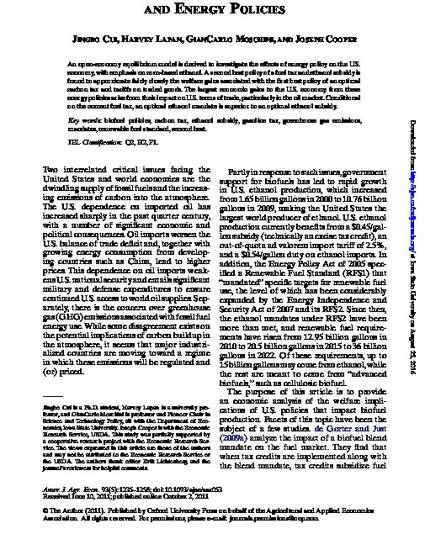
Article
Welfare Impacts of Alternative Biofuel and Energy Policies
American Journal of Agricultural Economics
Document Type
Article
Disciplines
Publication Version
Published Version
Publication Date
1-1-2011
DOI
10.1093/ajae/aar053
Abstract
An open-economy equilibrium model is derived to investigate the effects of energy policy on the U.S. economy, with emphasis on corn-based ethanol. A second best policy of a fuel tax and ethanol subsidy is found to approximate fairly closely the welfare gains associated with the first best policy of an optimal carbon tax and tariffs on traded goods. The largest economic gains to the U.S. economy from these energy policies arise from their impact on U.S. terms of trade, particularly in the oil market. Conditional on the current fuel tax, an optimal ethanol mandate is superior to an optimal ethanol subsidy.
Rights
Works produced by employees of the U.S. Government as part of their official duties are not copyrighted within the U.S. The content of this document is not copyrighted.
Language
en
File Format
application/pdf
Citation Information
Jingbo Cui, Harvey Lapan, Giancarlo Moschini and Joseph Cooper. "Welfare Impacts of Alternative Biofuel and Energy Policies" American Journal of Agricultural Economics Vol. 93 Iss. 5 (2011) p. 1235 - 1256 Available at: http://works.bepress.com/giancarlo-moschini/57/

This is an article from American Journal of Agricultural Economics 93 (2011): 1235, doi: 10.1093/ajae/aar053.